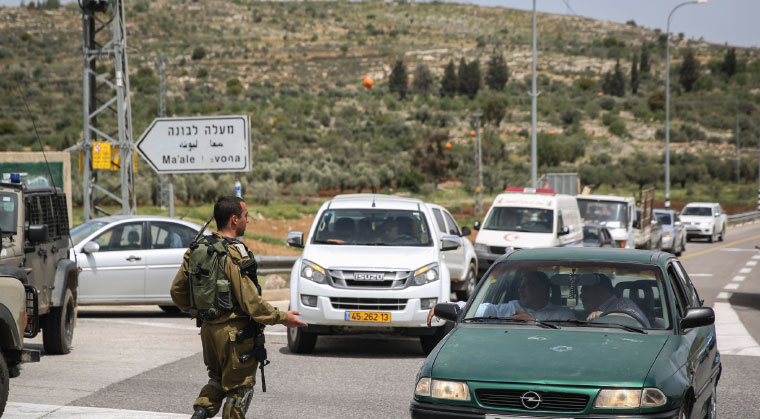Tight Security Win-Win for Jews and Arabs


WIN-WIN SCENARIO It is clear to all sides that if there is quiet in the area the primary beneficiaries will be the residents both Jews and Arabs (Photos: Flash90)
D epending on where in the world you drive road rage takes different forms and calls for different countermeasures. Commuters in Judea and Samaria for example often find their routes blocked by stone-throwing tire-burning Palestinian rioters. It is a gloomy fact of life so routine it doesn’t make the evening news and the IDF has been challenged to formulate a response more effective than simply closing roads.
Two recent cases in point in the Binyamin administrative area: A few weeks ago on Highway 60 — the transportation spine of the West Bank — motorists found themselves under a hail of rocks as they traveled by the Arab village of Sinjil about halfway between Jerusalem and Shechem adjacent to the settlements of Shiloh and Eli.
Around the same time a Jewish driver on Highway 60 had to fire his weapon to fend off Arab attackers from the town of Huwwarah near Shechem. The next day — a Friday the traditional day of Muslim unrest in the region — saw an angry upsurge in crowds hurling projectiles and lighting fires.
What set these episodes apart from the usual dismal litany was the IDF reprisal. The night of the Sinjil incident army forces swarmed the village and the surrounding area ultimately rounding up six Palestinians identified as stone-throwers and confiscating a large cache of weapons. Rioters in Huwwarah found themselves confronting a phalanx of soldiers border police and police officers from the Shai District who swiftly tamped down the uprising and arrested many participants.
And perhaps most significantly to the delight and surprise of travelers Jew and Arab alike Highway 60 was kept open during these enforcement actions allowing traffic to flow smoothly.
The IDF’s posture has imposed a relative calm on the area and civilian authorities attribute it to the strategy devised by Kedem battalion commander Elad Edri. In addition to substantially augmenting military and police forces in the region and deploying them densely along the main arterial Edri in a nod to Muslim sensitivities has permitted an increased number of worshippers to travel to Jerusalem for Friday prayers during Ramadan — an especially restive period on the Islamic calendar which this year coincides with the Jewish month of Sivan. Israel’s civil administration for the Judea and Samaria communities reports that on Friday two weeks ago 39 000 Arab residents of the Binyamin region were allowed access to Jerusalem compared to 16 000 for the same period last year.
Edri’s compromise has garnered admiration across the board and gone a long way toward soothing tensions. “It is clear to all sides that if there is quiet in the area the primary beneficiaries will be the residents both Jews and Arabs ” said one source.
Binyamin residents noted to Mishpacha that the massive deployments are scheduled during the evening and night hours. The concentration of the forces along the route both prevents stone-throwing attacks and enables swift and immediate response to any sudden development.
The IDF’s efforts have been aided by what they say is a calmer general atmosphere since Palestinian prisoners in Israeli jails declared an end to their hunger strike on May 27. This year’s hunger strike protests drew only 3 500. Security forces hope these signs point to calm in the longer term. (Originally featured in Mishpacha Issue 664)
Oops! We could not locate your form.













